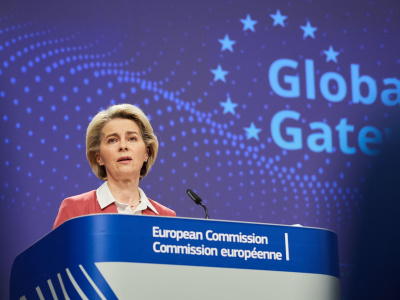
The new German government: A breath of fresh air or more of the same?
After two months of tough negotiations, the German traffic light coalition (led by the Social Democrats and backed by the Greens and the Free Democrats) has unveiled its coalition plans. Boldy titled ‘Mehr Fortschritt wagen’, which roughly translates to ‘Dare to make more progress’, the 177-page document is full of ambitions to change and modernise Germany. The text is aspirational, yet remains humble in tone. With the 16-year-long Merkel era coming to an end, the incoming coalition promises to overcome the status quo and introduce a “paradigm change”.
But does the coalition agreement indicate a real change in course for Germany’s foreign and security policy and its development cooperation? The answer is yes and no. For Europe and the world, it does not imply a major turnaround. In many ways it continues the pro-European and multilateral footsteps of Merkel. Yet, at the same time, it introduces some interesting and new accents and suggests bold steps for the European Union to make it more performing in the future. The agreement stresses that the big challenges of today can only be tackled through international cooperation and within a strong EU. Nevertheless, the main stumbling blocks may well be internal. The Leitmotif, as put by future Vice-Chancellor Robert Habeck from the Green Party, is to achieve “an active society, an investing state and a Germany that simply functions”. And here the tasks are immense. The COVID-19 pandemic, climate change, an ecological transformation of the economy, digitalisation, health and social justice are all priorities that big parts of the electorate expect to see progress on and change. This will, without any doubt, absorb a lot of energy by the new government.
More continuity than change in foreign and development policy
By and large, the proposal is characterised by continuity in German foreign policy, and in spirit it does not deviate too strongly from the previous government. This brings a degree of stability and reliability. Yet, while remaining vague on many questions, especially on how to balance tensions between Realpolitik and values, it provides room for manoeuver. The proof will thus be in the pudding.
The coalition stands for a normative and more value-based foreign, development and security policy that is decisively more European, and aims to work towards multilateralism together with international partners. It champions the concept of European strategic sovereignty, while introducing terms such as ‘strategic solidarity’ with international partners to promote global causes. The tone towards non-democratic and authoritarian governments is stricter and more confrontational, but whether this means substantive political change remains to be seen. It will be interesting to watch what choices the new government will make and how these play out in practice.
The coalition promises adequate finances and proposes a long-term goal of spending 3% of gross national income (GNI) on diplomacy, development and security – a compromise formula to circumvent the sensitive 2% spending discussion on security matters to honour responsibilities towards NATO.
The coalition also makes a clearer commitment to development cooperation than the previous government. Whereas the previous coalition merely noted a spending target of 0.7% of GNI for development cooperation as an objective, the current agreement states that “we will adhere to a minimum of 0.7% of GNI” – a goal that according to the Organisation for Economic Co-operation and Development has been achieved only in 2016, part due to the refugee crisis, and in 2020. The good news is that there is also a concrete promise to expand humanitarian aid and to keep an eye on deploying it in ‘forgotten crises’.
Fresh elements: A feminist and climate foreign policy
A refreshing element is the coalition’s announcement to act in accordance with a feminist foreign policy, following in the footsteps of its Swedish neighbour. This innovative and important approach will likely be spearheaded by Annalena Baerbock from the Green Party, who is a candidate for the post of German foreign minister, which was never before held by a woman. While the Greens championed the idea, the Liberal Party struggled with the term and pointed out that it does not mean anything concrete.
An explicit focus is on strengthening the rights, resources and representation of women and girls worldwide, promoting societal diversity, appointing more women into international senior positions and implementing and developing further the Women Peace and Security agenda. But the coalition contract also mainstreams topics important for a feminist foreign policy throughout, including intersectional equality, implementing the Istanbul Convention in the digital space, overcoming colonial continuities and supporting a national law to control arms exports amongst others. If this approach will be a success, we can expect a much more inclusive and holistic perspective on Germany’s foreign policy.
Perhaps not surprisingly, climate runs like a thread through all policy areas and will play a key role in Germany’s international cooperation and security policy, including at the EU level. The European External Action Service’s (EEAS) recent initiative for an integrated approach on climate change and security or discussions in the EU Council to strengthen the role of climate change in relation to migration and mobility externally are likely to receive strong German support. In the context of the G7 Presidency next year, Germany emphasises climate partnerships as a new instrument, as well as an international climate club to move towards climate neutrality and renewable energies. Development partner countries can also expect increased resources for international climate finance.
Strong commitment to but few innovations in development policy and towards Africa
The value-based nature of foreign policy is most visible in a clear emphasis on human rights – which is stronger than in previous governments’ commitments. Not new however are the list of topics for development cooperation ranging from food security, policy coherence, social protection, gender, health, urbanisation, water, sanitation and hygiene, climate and biodiversity, debt relief and taxation, civil society and democracy. In the chapter on development cooperation, one looks in vain for inspiring or more concrete ideas beyond a list of the usual good intentions. It does however mention one potentially innovative instrument: a global fund for social protection to address poverty.
International cooperation will be the responsibility of a full-fledged ministry, separate from the foreign ministry as has been the case to date. Rumours about a merger, as we have seen in the United Kingdom, have not been confirmed. It will be led by a politician of the Social Democrats who is still to be appointed by early December. It will be interesting to see to what extent this person will give shape, direction and sharpness to this portfolio.
The coalition contract aspires to more strongly connect policy fields and strengthen coherence concerning international activities. While there are some good examples from a development perspective, for example in the commitment to fair value chains or in ensuring that agrarian exports do not counter market development in partner countries, there are missed opportunities in other fields, such as in the area of migration, which is neither described as instrument in the context of the chapter on development nor in relations with African countries for example.
Also the paragraph dedicated to Africa does not deviate from priorities of previous governments or those formulated already at the EU level. Stability in the Sahel is mentioned – but also here the text remains vague, and does not offer strong insights into the how.
Strongly worded aspirations for Europe
Perhaps the most aspirational and strongly worded elements of the agreement are the ideas for Europe. Indeed, the text mentions ‘Europe’ about a hundred times more often than the word ‘Germany’.
The coalition’s overall goal is for the EU to be a stronger and more sovereign actor.
First, it wants to support the gradual development of the EU into a federal state and to strengthen the role of the European Parliament. But the details of these ambitions are not further elaborated and they will surely lead to contentious discussions in international circles, but also within the new coalition government, which will be pro-Europe but to different degrees.
Second, it wants to strengthen and reform the EEAS and for the High Representative for Foreign Affairs and Security Policy to become a real ‘EU foreign minister’.
Third, it suggests that the EU should move to qualified majority voting on foreign policy to increase its capability to act. It also envisages a mechanism ensuring that smaller member countries are heard and participate appropriately in decision-making, but it remains to be seen if this can convince smaller EU member states to agree to a change in voting procedures.
Fourth, the coalition plans to help shape the EU’s forthcoming Strategic Compass – the EU’s new military strategy – and wants it to become ambitious in the field of security and defence. It plans to strengthen EU crisis management through joint command structures and a European civil military headquarters.
Merkel ++
This programme clearly brings fresh air into the future governance of Germany. It is a compromise document between three parties that have never worked together at the federal level before, but whose leaders understand the need to move the country forward – on foreign affairs, development and security – by building on the past government. Despite many compromises, the image the incoming government portrays is one of competence, realism and pragmatism. Perhaps the best way to describe the proposals for Germany’s future foreign, security and development policy is ‘Merkel +’, but with the potential of realising further aspirations and becoming ‘Merkel ++’.
The views are those of the authors and not necessarily those of ECDPM.





